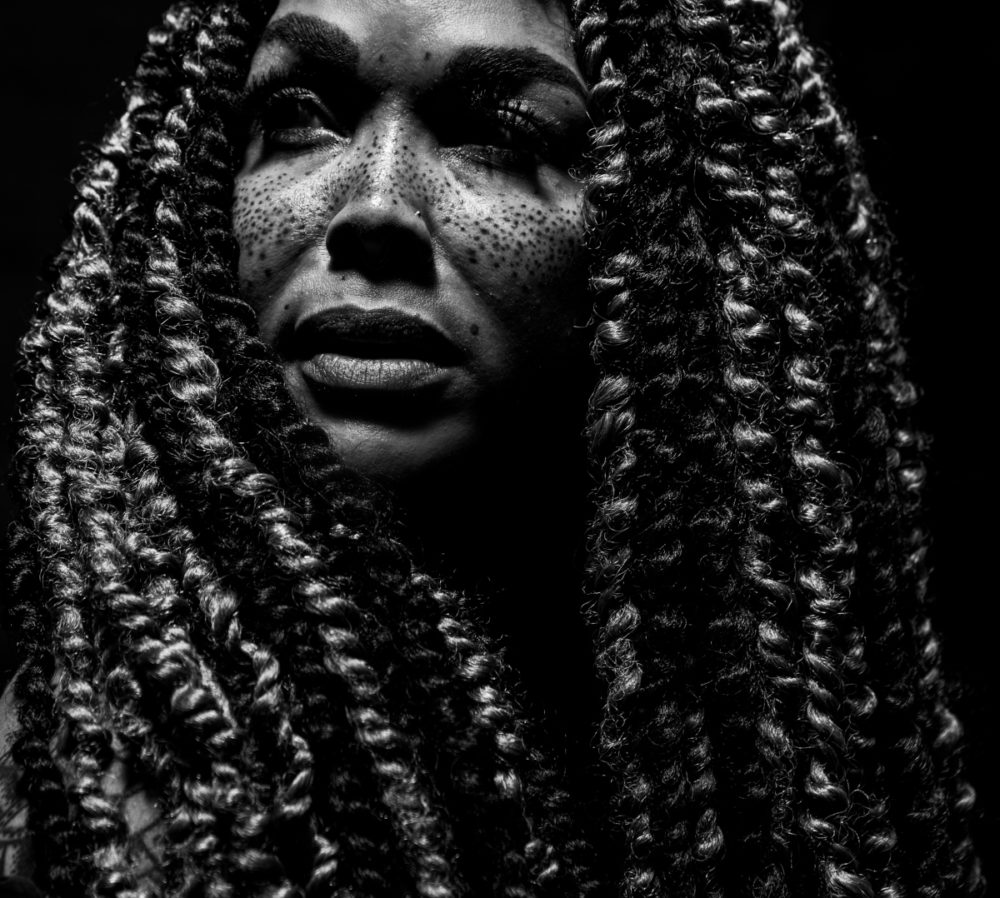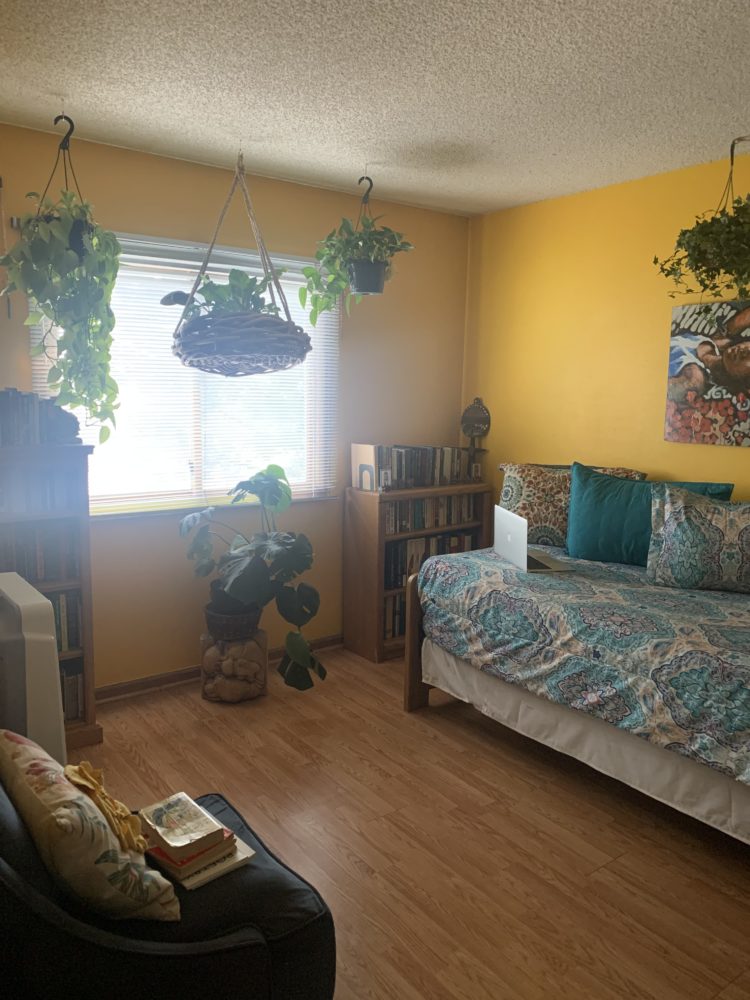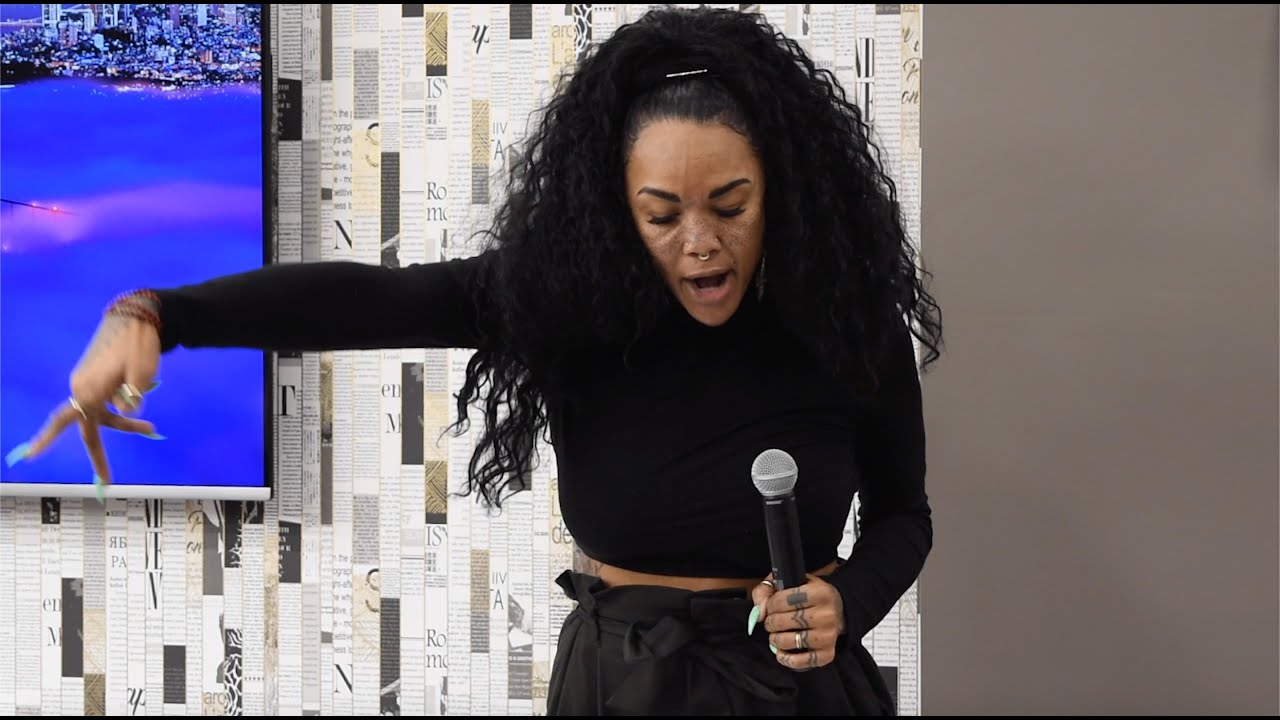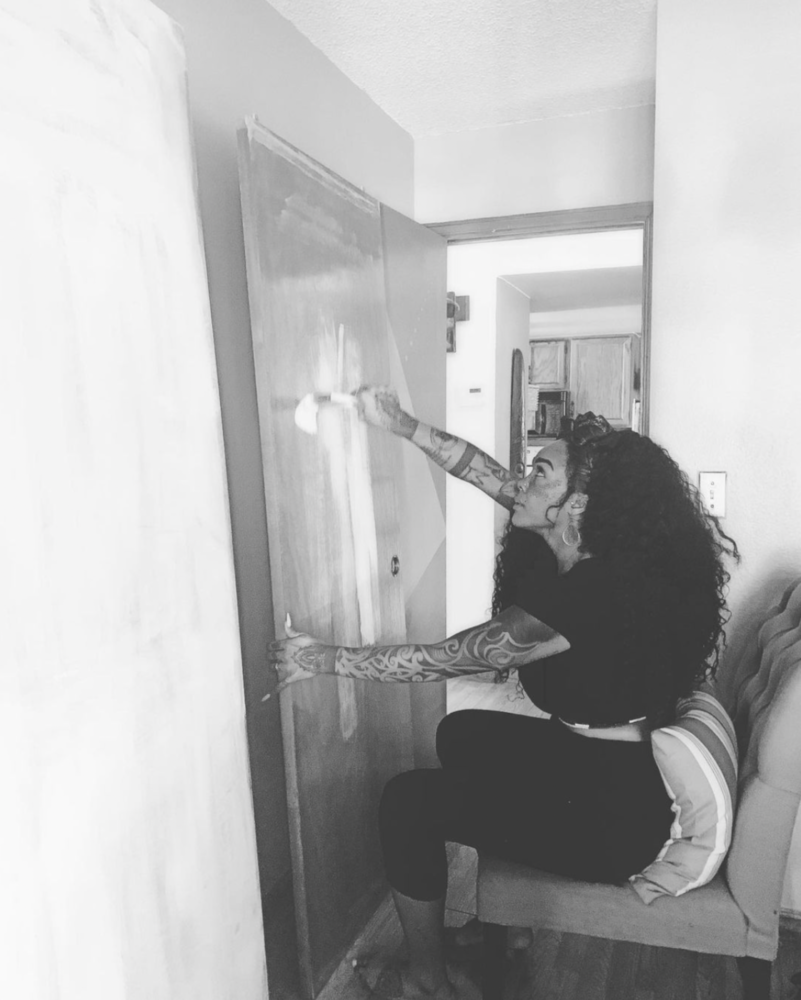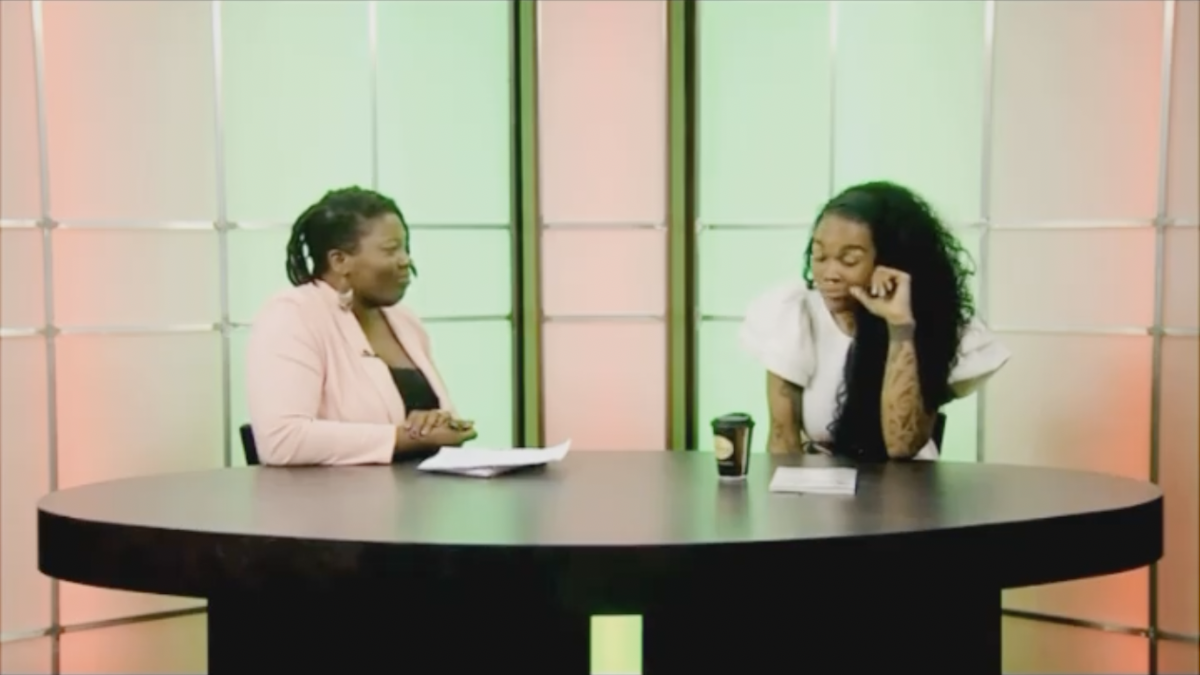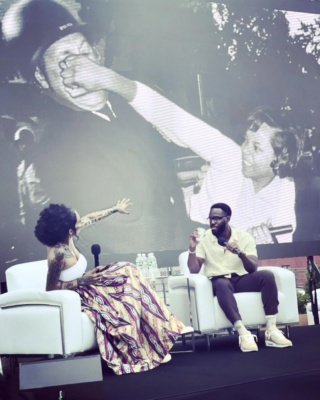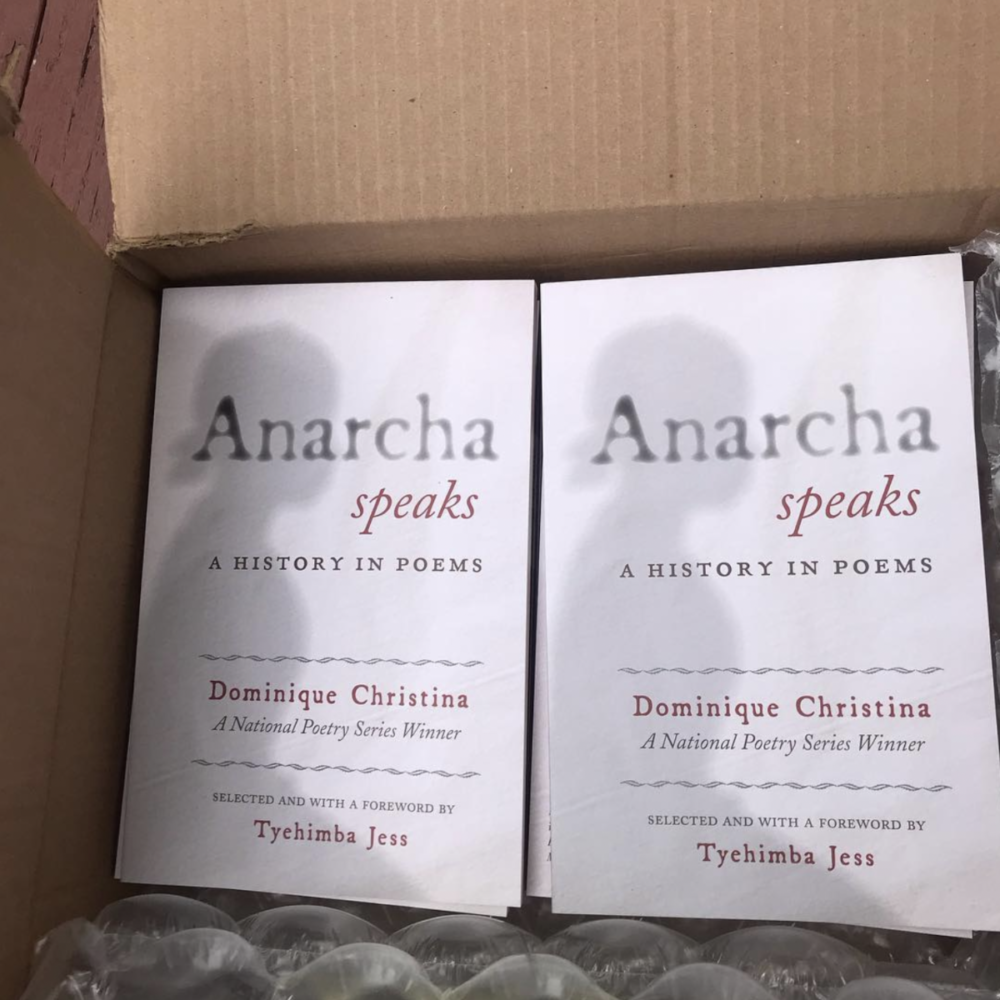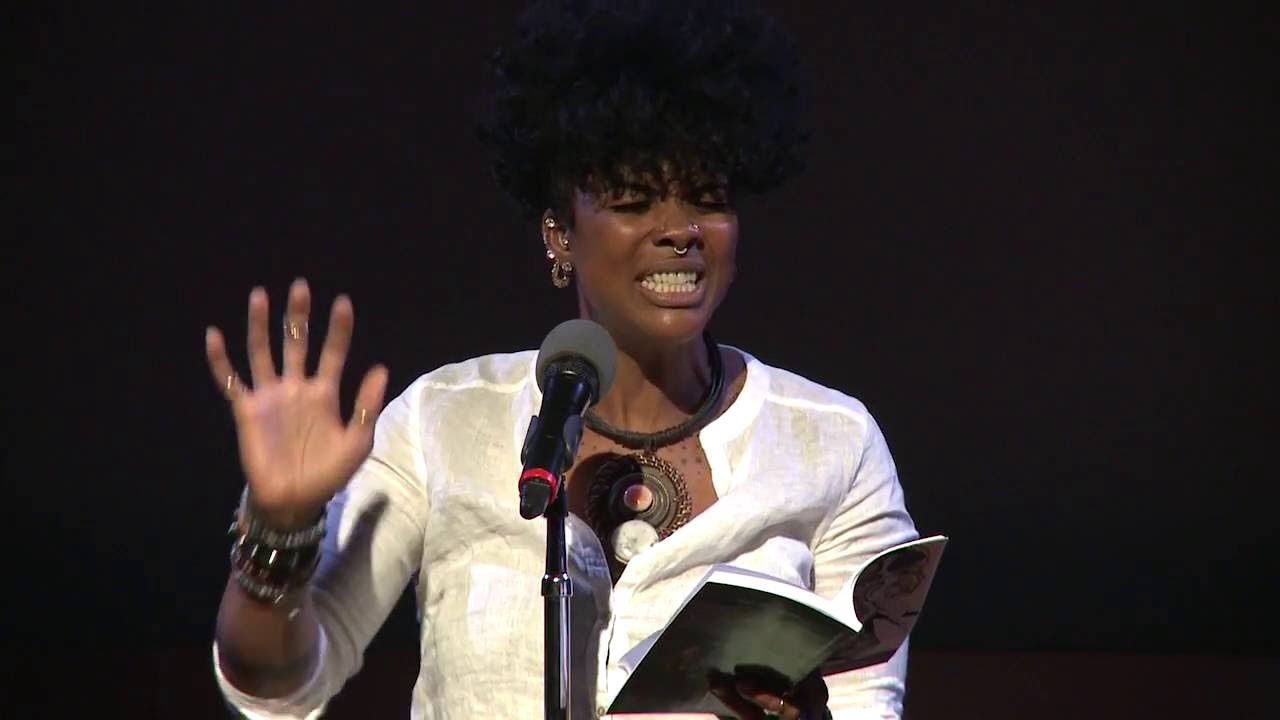October 2021
“I was born into a family that loved language and used it musically. And lyrically. My grandfather walked around the house reciting Shakespeare. My grandmother walked around reciting Paul Lawrence Dunbar. My mother introduced me to Poe and Whitman and Nikki Giovanni. I have always understood how available and how possible language is.”
Dominique Christina is an award-winning poet, author, educator, and activist. She holds five national poetry slam titles in four years, including the 2014 & 2012 Women of the World Slam Champion and 2011 National Poetry Slam Champion. Her work is greatly influenced by her family’s legacy in the Civil Rights Movement and by the idea that words make worlds. She is the author of four books. Her third book, “This Is Woman’s Work”, published by SoundsTrue Publishing, is the radical exploration of 20 archetypal incarnations of womanness and the creative process. Her fourth book “Anarcha Speaks” won the National Poetry Series award in 2017. She is a writer and actor for the HBO series High Maintenance and does branding and marketing for Under Armour.
ARTIST STATEMENT
I was born into a family that loved language and used it musically. And lyrically. My grandfather walked around the house reciting Shakespeare. My grandmother walked around reciting Paul Lawrence Dunbar. My mother introduced me to Poe and Whitman and Nikki Giovanni. I have always understood how available and how possible language is.
When I got to college I encountered Kierkegaard and Frantz Fanon and Toni Morrison and Elliott. I was a black girl with a fondness for canonical literature and classical language; the weird girl in the room who loved Chaucerian English when others were absolutely annoyed by it. It seemed a gift to me. This hidden language revealed who people were, how they lived, what they carried and even how they died. Writing introduced me also, to divergent ways to regard death itself. I thank John Donne for that. Death be not proud indeed. And I needed that language to explain things I had seen. To re-interrogate the deaths that had already impacted my life.
My approach as an artist and a writer is therefore a pedagogical approach which is to say, I am interested in the transmission of knowledge, following the Socratic tradition. The objective is to foster inquiry on the part of the reader, which perhaps can’t be “taught” in a simple sense of the word. I wouldn’t call it a method; I’d just call it a way of life. That’s why I don’t believe in “safe space.” I think that you should respect everyone, and listen to everyone’s positions, but ultimately I believe we are here to be challenged, and unsettled, unnerved and un-housed. And therefore, to be Socratic is, in fact, to inject people with perplexity and curiosity. No one of us has definitive answers; it’s an endless search for truth and knowledge. And that cuts across politics, ideology, race, gender, national boundaries, sexual orientation, and anything else. Now that’s the ideal, and whether I pull it off is an open question. But that’s what I’m about.
So it seems to me that when we talk about transmitting traditions, we’re not talking about transmitting ideologies; rather, we’re transmitting traditions of open-ended, robust, critical conversation and inquiry in our quest for truth. And this can be found in many places: it could be in Plato, Aristotle, Du Bois, Toni Morrison, Nietzsche or Stephen Sondheim for that matter. I’d love to teach a course on Sondheim and musical theater, another genius to reckon with…or jazz and the witchcraft conjure tradition of poetics in marginalized communities that perform language in ways that the dominant culture may not understand but which the dominant culture uses and benefits from nonetheless. But that’s my own pedagogical orientation. As an artist and a writer and therefore a trouble-maker, my specific agenda is to insist on myself, name myself, claim myself and defend myself against that which would keep me silent.
Dominique Christina reads Cancelled Women
Women’s Liberation Front, Jan 23, 2020
Image courtesy of Women’s Liberation Front’s YouTube | VIEW
IN DISCUSSION
Carli Toliver / I just want to say that I am very excited to speak with you and so thankful for your time. After reading many of your poems and watching some of your performances online, I am incredibly humbled to be in conversation with you. Your work is beautiful and brilliant.
In preparing for our conversation and re-reading The Bones, the Breaking and The Balm I came to this stanza:
One wicked
Woman
Setting the
Geography
Of her soul
To stone
To yowl
Her claims
To you
And when I read that (after having read Anarcha Speaks and This is Woman’s Work), I felt like the stanza speaks to so much of what you do in your poems and performances. In playful ways, powerful ways, in harrowing ways. Articulating the Geography of the Soul. Whether that be Coretta Scott King, or Anarcha, or the poem’s “I”, it feels like much of your work is mapping a soul profoundly and intimately connected to the body.
In other interviews you’ve mentioned your process as one of sitting and waiting on an ancestral “other” to come; another voice. Which also feels like a weaving together of the seen and unseen, body and soul. I don’t want to pry too much into your process, but I do wonder, what have you learned from your process over the years? And maybe, the better question is, has your process informed or shaped what you feel is your calling, or your vocation, as an artist and a writer?
I am also thinking of this question because I read your books in backward order starting with Anarcha Speaks. And I just remember thinking, to have sustained such a brilliant and methodical meditation on Anarcha, to give voice to and imagine the depths of her experience, to go there and wait there, must have required an incredibly strong and well supported place. So often, when tragedy strikes the saying, “I can’t imagine what you’re going through,” almost inadvertently arises. Because to imagine it, that awful thing, to take that time and really put yourself there, is possible but the price is high. And reading the poems and performances and prose that precede Anarcha, the wisdom and the work of those pieces feels like groundwork that, at least in part, was a bridge to imagining Anarcha’s story. When you started writing Anarcha, when that process unfolded, did her story begin in the beginning and proceed in a linear order — or did it come in pieces, that you later placed into their right order?
Dominique Christina / My process has always been alchemical. I didn’t design it that way. It’s what happened when I elected to move out of the way and let whoever wanted to speak, to do so. To me or through me but I let them speak. The “them” in that sentence is ancestral indeed. I write elegiacally so often and it always feels like conjure…like ritual. So I suppose what I have learned from that process is that we are never really gone. I learn that the diaspora is vast and expansive and complicated and busy and available to me. I inherit all of their magic in the writing. I have been doing it so long they wait in a long line to get a word in. I permit it all. Some days it tips me over. I have learned that from my writing process as well. I’ve learned that we have been so many people…so many versions of ourselves are still sort of floating out here and we can access those things if we are willing to move ourselves out of the way and not be so tethered to our egos or our way of knowing or understanding a thing. I have the experience (often) of language coming from me in the writing that either does not belong to me or something I flat out don’t understand. I trust it. I have learned to do that through my process too. It’s holy I think. Sacred. To be available to the old ones is a sacrament. To be deliberate about practicing that ritual often; to let those who preceded me have a dance informs every bit of who I am as an artist and a writer and a mother and a daughter and a lover and a friend. As a teacher, as an activist, as a survivor. Yeah, all of it is, in one way or another, emphasized by my process. Made more urgent by my process. My process tells me I am not alone. My process tells me my grandmother is still looking over my shoulder. My process shows me how much our folks loved us. They loved us so much they stayed. They survived the unsurvivable. And I get to, in turn, be an answered prayer. It doesn’t get much more seismic than that.
In terms of Anarcha, my writing process there was different only in that I typically write very quickly. Almost manically. But I couldn’t do that with Anarcha. She was too much for that. She required a slow and willful pace. She required long breaks and nighttime strolls and grief. So much grief. It took me longer to write her. I initially attempted writing about her in a third person omniscient narrative voice. But every time I tried it that way I got stuck. That was important because I never have writer’s block. I don’t even really believe in it. So I knew there was something about my approach that she didn’t like. When I went back at it and started writing in the first person, the words were right there. I never expected to write about Anarcha. I didn’t even know about her. She showed up one day when I was researching the etymology of the word “anarchy.” There she was at the very bottom as an asterisk. When I clicked on her name my life changed. I had to center her. She deserved to author her own story. She deserved a voice and a reckoning. She deserved to be remembered. We owe it to her to remember. At least…that’s my philosophical orientation. The layout of the book is exactly as it came out of me. The order was not changed. It came through in a mostly linear fashion. I knew I was tapping into something because the writing process would leave me feeling dizzy, spent and anguished. And when I would go back and look at the writing later I had no recollection of having written it. That’s when I knew she was there. It was devastating…but it was holy too.
“My process has always been alchemical. I didn’t design it that way. It’s what happened when I elected to move out of the way and let whoever wanted to speak, to do so. To me or through me but I let them speak.”
CT / I love that description, elegiac. Do you practice any other forms of art or making? Do you ever write in other genres or styles, or is poetry your preferred form? Are there other ways you practice conjure or divination?
It’s really interesting that you say the process of writing Anarcha was slower because I remember feeling that deliberate pace as I read. Something I think James Baldwin articulates powerfully in much of his writing is that white Americans have to get to a place where they are willing to ‘give up the ghost’ and face the invention of whiteness for their own healing. To be curious about the price of that invention and really account for what was lost. Anarcha’s story is (for me) both her individual personal story – but also a metaphor for this greater social experiment that is America. And, yes she needs to be remembered, yes she needs space to speak, to tell her story, to say: this is what happened to me. This is what it felt like to be the unknown, the site of experimentation, the raw material. And I feel like part of the importance of this telling is because it reflects an unanswered silence: what did that exploration or invention do to white America? What did the institution and creation and grand social experiment of America do to white people? To their souls, to their spirits, to their sense of self? We are well past James Baldwin’s time but do you think that this kind of reckoning is still required or have we moved on from that into another space altogether?
DC / I paint too. Not in any publicly known way. Not yet any way. I’m gearing up for an exhibit in a few months though and then that will change. I love film making. I intend to try my hand at curating a documentary. And yes, I do write essays, short stories, and am moving into musical scores and micro-plays. I love theatre very much and I miss making music.
My divination practices are most aligned with Candomble/Santeria. You know…African spiritual technology and its relationship to the new world’s God. But I am my own religion and temple…my own answered prayer. I’m the one who prayed. And the one who answered.
The invention of race and the exploration of that idea married whiteness to oppression. The performance of whiteness at least, is obliged by a colonizer’s interpretation of the world and the people in it. And that is a brutal, merciless, egoistic interpretation of the world. The us and them dichotomy seems inevitable in the natural world. But the invention of whiteness necessitated the invention of the nigger too. And the “Indian.” And on and on. The concept metastasized and has become a part of our national identity and most certainly our ideas about who we are. White supremacy is the most violent psychological disorder I have ever seen. To imagine that you are more valuable and more necessary than any other living thing on the planet is to exist in myth. And like most myths, they are interrupted by reality. Whiteness seems exhausting to me. To defend an indefensible argument. To be willing to kidnap, brutalize, rename, misname, brand, commodify, rape, assault, imprison and murder whole groups of people in defense of an indefensible argument. I’d rather be outside. I’d rather sing and fall in love and learn my magic. Trying to prove you’re better than someone else is a terrible hex. Terrible. White folks performing whiteness is the most deadly virus on this planet. I think white people who have been stitched to the idea of whiteness will have to grapple with that inheritance for sure. I think it will likely look and feel like a “reckoning.” I got ancestors who need answers. The bottom of the Atlantic is peppered with the bones of folk who need answers. Anarcha still needs answers. They’ll get ‘em. I haven’t “moved past” anything. I do levitate above it but I am in no way past it. Is there a county in this country that hasn’t hosted a massacre? That requires a reckoning.
In an interview with editor-in-chief, Lauren K. Alleyne, Dominique makes the case for her admiration of Edgar Allen Poe
Furious Flower, November 2019
Courtesy of Furious Flower’s YouTube | VIEW
CT / I should have clarified “moving on” to mean that I wonder if maybe we’ve moved into an even darker place; that a reckoning as James defined it for white Americans in the 1960s, is no longer adequate. That maybe something more, or different, is required now.
I recently read Charles Blow’s book called The Devil You Know and he proposes all young, willing and/or able black folks reverse migrate and return to nine southern states (from Delaware to Louisiana) as a way of controlling state governments with the influx and consolidation of black voters. That the migration north and west has failed, the power of the black vote means nothing in cities like New York and Seattle and San Francisco, and is where most violence against black folks/communities is happening now. He also proposes this as a return to a cultural and familial home for black Americans. I was raised in the south and never wanted to remain there as an adult, but his argument was interesting. I’d love to know your thoughts on this, especially given your family’s legacy in the Civil Rights Movement and your own experience of the south. Sometimes, especially in the past 3-4 years as I’ve moved, or been contemplating a move, I’ve wondered – where in this country should I go? Where can I afford to go and where is a “good” place to be a black woman in America?
I’d also just really like to ask you some questions about writing, because they are questions I often wonder about/am still learning. You said earlier that you write sometimes manically, but what about revising? How do you know when a piece is done? Do you edit and revise many drafts, or not really? If writing is a sort of getting out of the way, editing seems more like a negotiation and ego is a little more involved. How much room/time do you give that revision process?
DC / It’s an interesting thing to consider. What does a reckoning look like for white Americans? In some respects it’s probably already in motion. It’s in the psyche of American culture, race and race relations. It was allowed to exist for a while in the margins. On the fringes of and in the shadow self of our collective cultural identity. Naturally the folks facing the barrel of a gun are more aware of the nature of war than the ones who benefit from the bodies in the street but I think the veil has been lifted. A proper hex for the shadow man. Not all curses can stay.
A repatriation back to the south is an interesting notion. I do see the benefits in it. I also see the heavy lifting for the black folk electing into that in the interest of impacting how southern states govern. My family left Little Rock Arkansas on purpose. When I went to grad school in Arkansas I did so on purpose. When I left, I meant it. The south cajoles and rocks. But it also haunts and fails. In a very specific way because it’s not like cities don’t fail us too. They do. All the time. My experience is that the south resists becoming anything other than itself. It’s identity seems tethered to remaining recognizable whereas cities often shift and contort, changing often to become some new thing. Jazz. I love the south and I’m also always lamenting it. When I lived in LA I was alone. Singular in an almost unsurvivable way. When I lived down south I had many. I had plenty. Covered and fed. Folk gave me their stories and their prayers. I was never alone. But the ghosts wouldn’t leave me alone either. And that became untenable.
In terms of the revision process…I don’t have one. How it came out is how it goes out. That’s not because I insist on it. That’s just how it has consistently gone for the last four books. There are certainly questions about whether a word is meant to be capitalized or uncapitalized or whether I meant a period instead of a comma in the editing process but that’s it. How it came out is how it goes out. There’s something witchy and wonderful about that. That’s on brand for me. The ritual is the ritual. I said what I said. Or more to the point: They said what They said. Yeah that.
“In terms of the revision process…I don’t have one. How it came out is how it goes out. … There are certainly questions about whether a word is meant to be capitalized or uncapitalized or whether I meant a period instead of a comma in the editing process but that’s it. How it came out is how it goes out. There’s something witchy and wonderful about that. That’s on brand for me. The ritual is the ritual. I said what I said.”
CT / I think these will be my last few questions. I am so very thankful for the time you’ve made for this interview and allowing me the space to be in conversation with you.
I love that, the liberation of that, accepting the words as they come. It can certainly be helpful to learn the boundaries or proscriptions writers set on their practice but usually I’m most grateful for the permission they grant. It’s always a reminder that our practice and our process is really our own. I also love the idea that we get to continue processing a topic, an experience, an event and can write/make art about that something for as long as we like, world without end. That was a very liberating one for me as well.
Do you have a consistent place to write, or a routine, or a regular writing schedule you keep, a same time that you sit down each day? I just read about another writer’s practice. She says her research practices have a structured schedule that can last for months, sometimes years, but that when it’s time to write she goes down a rabbit hole and will be there for as long as it takes.
Love Jones has been on Netflix this month, so I’ve re-watched that movie a few times and I forgot how much poetry and spoken word is in the background of that film. I’ve found that being in community with other artists and writers has been a valuable place to exchange ideas, provide feedback, and just stay connected and supported. I wanted to ask you about graduate school—for a long time now I’ve imagined that graduate school would offer that kind of environment of connection/community around ideas, creativity and maybe also even critique or research. How was graduate school most beneficial to you, as an artist and creator? Is there anything you would tell your younger self about that experience to prepare her/advise her? Have there been other places beyond graduate school where you’ve found community with other artists?
With any of the other work you do creatively, you mentioned film making, theater, music and painting, are any of those practices collaborative? Are you working on any collaborative partnerships now?
DC / I have enjoyed our back and forth, so thank you too. I do not have a particular rigidity with respect to where or what time when I write. The only commitment I have made is to write every day. I tried to tether myself to something more scheduled but that ain’t how ritual works for me. Sometimes I can find a pocket and stay in it for a minute. And by that I just mean there may be several days in a row where I am writing at relatively the same time of day. I just finished a volume of poetry dedicated to my middle son and during that entire process I managed to get it all done in the same room and I could not write at all until the sun was almost down with that one. That is the only time I have experienced that but I was writing about things that I hold as bruises. Secret bruises. Of which I have very very few. I have always been willful about openly discussing things that have harmed me in my past but this book is about naming what, for me, feels like the shadow side of my interior world and how those things can find an audience in your children. Despite your desires for them or even for yourself as a parent, we can’t always be the story our parents wrote for us nor are we always the version of the story we think we are…the story we intended to write is sometimes forfeited to a bigger lesson. And sometimes those lessons are among the most devastating to learn. At any rate, that was a different journey in writing for me and so I remained loyal to one specific room in my house. Blue walls. High ceilings. Dark and shadowy in the afternoons. It felt like the right place to tell a secret. If that makes sense…
On the subject of grad school I loved it entirely but that deserves a bit of context. My undergraduate experience was wholly about being a division one volleyball player. I had been cultivating that identity since I was thirteen. I only took classes that didn’t interfere with practice or weight training. I yielded to my coach’s way of thinking about things for four years. It was exasperating and at times, demeaning. I had a lot of suicidal ideation in undergrad. I felt so ill-placed. So lonely and so sad. And I was feeling all of that as a stand out division one volleyball player. Grad school for me was a reclamation. I wanted to have the experience of picking classes on the merit of them containing information I cared about or desired to learn or wished to be challenged by…not because they were before practice. I was so thrilled to learn. In every class. Even the technical stuff I took that sort of ran counter to more fluid modalities which are more my lane. But I took many philosophy classes too. I love philosophy so I soaked it up. I took every literature class offered. I had fun. And I really wasn’t having any fun in undergrad. My time in grad school confirmed for me that I meant it. I meant to be a learned person. I meant to curate an experience that was about helping me get to the best version of myself. I was in the deep south. I was interrupting space. I was discovering that I liked it. I came in contact with my politics in a wider way. In a more informed way and certainly in a more radical way. There was no one telling me what to do. I felt quite liberated. I realize now that I have been seeking experiences that allow me to travel back to that feeling or emphasize it still today. Like…I know I’m supposed to be brilliant and talented. I know I am supposed to be a wise student of history. I know I am supposed to insist on myself. I know I am supposed to rattle the cage. I know I am supposed to take what gifts belong to me to create opportunities for other folk. I know I am supposed to give my ancestors a wide space to collaborate and discuss and rage and grieve and praise. Ultimately, grad school gave me, me. I’m grateful for that. But my previous educative experiences informed how I approached grad school and how I made sure the experience I was having was the one I wanted to have…the one I needed. An affirming one. I realize that’s not everybody’s testimony or experience but it certainly was mine. I could have had that experience on any campus though. It wasn’t about the institution. It was about me.
I find community and tribe among artists often. When I was slamming I found it with slam poets. I find it with authors and teaching artists now. Poetry has brought me some of my most important relationships.
My intimate partner and I have many creative projects we are collaborating on and co-creating. He is a musician. We have a lot of synergy and a similar fervor around being fully expressed and being in the service of our respective gifts so it works. I struggle with collaboration historically. I’ve never been great at group projects. I have discovered as I’ve gotten older though that I am interested in it more. That is probably because I have spent the last 10 years saying all the things I needed to say for my own healing so now I’m available to…more.
Dominique Christina reads Mothers of Murdered Sons
Split This Rock Poetry Festival 2016, Washington, DC
Courtesy of Split This Rock Poetry Festival’s YouTube | VIEW
THE SIX…
Six questions asked of all our guests.
What are you currently reading?
Currently (re)reading “The Bluest Eye” by Toni Morrison.
What are you currently watching?
“Them” on Amazon. It’s a hot mess. A triggering mess but I am powerless against it.
What was the last meal you made?
Seafood gumbo.
Can you share a recipe?
Crawfish Étouffée:
New Orleans is my favorite American city. A haunted city. A ghosted city. An ancestral city. Anyway…you need jasmine rice (3-5 cups cooked is the goal), butter (about 3 tablespoons), one large white onion chopped up fairly fine, two cloves of garlic, a couple tablespoons of flour, a pound of crawfish tails, 2 tablespoons of tomato sauce, green onion (about 8 stalks chopped up fairly fine, salt, pepper, Thyme, 1 teaspoon of paprika, 1 teaspoon of Worcestershire sauce, and maybe a little Lawry’s for good measure. Sometimes I add a parsley garnish too but not always. You really should make your own Cajun seasoning but I don’t have time to get into it…
Anyway, first you want to melt your butter in an iron skillet over medium heat. Then you add your onion and sauté it until it smells good and it is translucent. Then stir in your chopped garlic clove and cook for a couple minutes. Then add your flour and stir it around until it’s blended well with your onion and garlic. Then stir in tomato sauce and 1 cup of water, then add crawfish tails and bring to a simmer. Add green onions, salt, pepper, Lawry’s seasoning, thyme, paprika, and Worcestershire sauce, and then look at it real hard until it starts looking like something you wanna eat. Simmer for 15 minutes or so on low heat until the crawfish is cooked through but still soft. Serve on top of your jasmine rice and say amen. Amen for good food and the ability to make it. Amen for what the waters provide…and the earth…and our ancestor’s ingenuity and creativity. Amen.
Whose studio have you visited recently that really excited you?
I haven’t visited anyone’s studio lately. I love RedLine Art Gallery in Denver. I love False Ego gallery in Denver.
What have you seen recently (either art; performance; film, music; stage; etc.) that had a significant impact on you and your work?
The last thing I saw that had a significant impact on me was the documentary “I Am Not Your Negro” by Raoul Peck using James Baldwin’s unfinished book. It is transcendent and I am so grateful that we had Baldwin to curate language that corroborates our reality in this country. Still.
A sincere thanks to Carli and Dominique from john ros and studioELL — thank you for the generosity you’ve shown in sharing your conversation with us.
Carli Toliver is a writer from the Shenandoah Valley who began writing at her kitchen table after work. She kept writing in the off hours while working as an admissions counselor, academic advisor, admin, receptionist, substitute teacher, dog walker, yoga studio manager and bookseller. Thankfully, her writing has persisted.
This interview was conducted over a series of emails which started with a few initial questions and led to a responsive conversation. The text has been edited slightly for this publication.
studioVISIT Artists
Tash Kahn + john ros | Jeannine Bardo | Dominique Christina | Stephanie Williams | Vishwa Shroff | Chloë Bass | Natalia de Campos + Thiago Szmrecsányi | Elly Clarke | Sameer Kulavoor | Alfonso Fernandez | Nyeema Morgan
